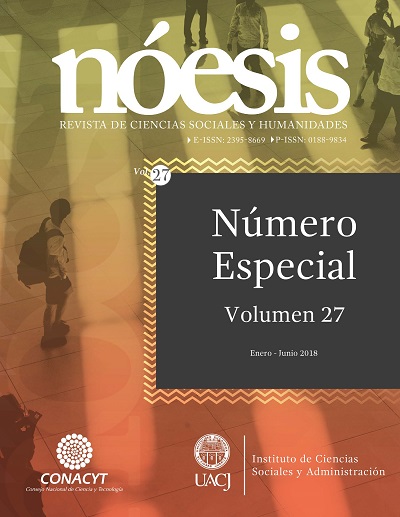Organizational culture and competitive intelligence in a higher education institution of northern Mexico
Main Article Content
Abstract
The objective is to describe the organizational culture (OC) of managers, administrators and teachers of higher institution in the north of Mexico and their vision of competitive intelligence (CI) in the collection of information for the achievement of institutional objectives. A qualitative and case study was conducted, with semi-structured interviews and grounded theory, in a theoretical sample of 14 participants and institutional documents. The coding was selective theoretical with a hypothetico-deductive model based on Cameron and Quinn's OC types and the CI cycle. It was found that the results of market OC that the institutional plan projects, only correspond to what the administrative mention and CI in the 2021 projection as institutionalized and regulated, although currently lack of knowledge about the CI of the institution and unification of criteria on who and what strategies they carry out. The document includes recommendations for the cultural change that is required in the 2021 projection.
Downloads
Article Details

This work is licensed under a Creative Commons Attribution-NonCommercial-ShareAlike 4.0 International License.
References
Alvesson, Mats. 2002. Understanding organizational culture. Londres: SAGE Publications.
Best, John. 1970. Como investigar en educación. Madrid: Ediciones Morata.
Bikmoradi, Alii, Mats Brommels, Alireza Shoghli, Davoud Khorasani Zavareh y Italo Masiello. 2009. Organizational culture, values, and routines in Iranian medical school. Higher education, 57 (4): 417–427. DOI: http://doi.org/10.1007/s10734-008-9152-2
Blaxter, Loraine, Christina Hughes y Malcolm Tight. 2000. Como se hace una investigación. Barcelona: Gedisa.
Bogdanowicz, Maryla. 2004. Organizational culture as a source of competitive advantage – case study of a telecommunication company in Poland. International Journal of Contemporary Management, 13 (3): 53-66.
Bryman, Alan y Emma Bell. 2015. Business research methods. Oxford: Oxford University Press.
Cáceres, Pablo. 2003. Análisis cualitativo de contenido: una alternativa metodológica alcanzable. Psicoperspectivas, 2: 53–82.
Calof, Jonathan. 1999. Overcoming competitive inteligencie barriers: A SCIP tool kit. Competitive Inteligence Review, 10 (1): 71-78.
Cameron, Kim y Robert Quinn. 2006. Diagnosing and changing organizational culture. San francisco, CA: Jossey-Bass.
Cekuls, Andrejs. 2015. Leadership values in transformation of organizational culture to implement competitive intelligence management: the trust building through organizational culture. European Integration Studies, (9): 244–257. DOI: http://doi.org/10.5755/j01.eis.0.9.12811
Chebbi, Jihene y Zeined Ammar. 2015. Influence of organizational culture on competitive intelligence practice: a conceptual framework. International Journal of Innovation, Management and Technology, 6 (1): 35–40. DOI: http://doi.org/10.7763/IJIMT.2015.V6.570
CIEES. 2018. Metodología CIEES. https://www.ciees.edu.mx/?catid=0&id=24 (15 de febrero, 2018).
CONACYT. 2017. Normatividad. https://www.conacyt.gob.mx/index.php/el-conacyt/normatividad (15 de febrero, 2018).
COPAES. 2017. COPAES. https://www.copaes.org/identidad.php (15 de febrero, 2018).
Cory, Henneth. 1996. Can competitive intelligence lead to a sustainable competitive advantage? Competitive Intelligence Review, 7 (3): 45-55. DOI: http://doi.org/10.1002/cir.3880070309
Creswell, John. 1998. Qualitative inquiry and research design. choosing among five traditions. Thousand Oaks, Calfornia: SAGE Publications.
de la Cuesta, Carmen. 2006. La teoría fundamentada como herramienta de análisis. Cultura de los ciudadanos, 10 (20): 136–140. DOI: http://doi.org/10.14198/cuid.2006.20.19
Denison, Daniel y Gretchen Spreitzer. 1991. Organizational culture and organizational development: a competing values approach. Research in Organizational Change and Development. 5:1-25
Dill, David. 2012. The management of academic culture revisited: integrating universities in an entrepreneurial age. En Managing reform in universities. Issues in higher education, editado por Stensaker B., Välimaa J., Sarrico C. Londres: Palgrave Macmillan, 222-237.
Echeverría, Genoveva. 2005. Apuntes docentes de metodología de investigación análisis. Universidad Academia de Humanismo Cristiano. Escuela de Psicología. Chile: Universidad Academia de Humanismo Cristiano.
García, Montserrat. 2011. Contribución de la inteligencia competitiva en el proceso de adaptación al EEES: el caso de las universidades españolas. Tesis doctoral, Barcelona: Universitat Oberta de Catalunya.
Giustozzi, Emilie y Betsy Van der Veer Martens. 2011. The new competitive intelligence agents: “Programming” competitive intelligence ethics into corporate cultures. Webology, 8 (2): 1–12.
Hatch, Mary y Majken Schultz. 1997. Relations between organizational culture, identity and image. European Journal of Marketing, 31 (5/6): 356–365. DOI: http://doi.org/10.1108/eb060636
Hernández, Rafael. 2014. La investigación cualitativa a través de entrevistas: su análisis mediante la teoría fundamentada. Cuestiones Pedagógicas, 23: 187–210.
Hernández, Roberto, Carlos Fernández y Pilar Baptista. 2014. Metodología de la investigación. Ciudad de México: McGraw-Hill.
Kbrom, Berhane. 2004. The relationship between organizational culture and competitive intelligence performance in the context of Eritrean trade and manufacturing industries. Tesis de Maestría, Stellenbosch: University of Stellenbosch.
La Palme, Kathleen. 2003. How can competitive intelligence best adapt to organizational chenge? En Controversies in competitive intelligence. The enduring issues, editado por Craig Fleisher y David Blenkhorn. Westport: Praeger, 1–33.
Martín-Crespo, Cristina y Belén Salamanca. 2007. El muestreo en la investigación cualitativa. NURE investigación, (27): 1–4.
Martínez, Miguel. 2018. Validez y confiabilidad en la metodología cualitativa. Paradigma, 27 (2): 1–13.
Mejía, Julio. 2000. El muestreo en la investigación cualitativa. Investigaciones sociales, 5 (4): 165–180.
Moffat, Lisa y Craig Fleisher. 2003. How can an organization´s culture be changed to better support competitive intelience? En Controversies in competitive intelligence: the enduring issue, editado por Craig Fleisher y David Blenkhom. Westport: Praeger, 266-280
Petrişor, Ioan y Natalia Ana Străin. 2012. Approaches on the competitive intelligence. The USV Annals of Economics and Public Administration, 13(1): 1-109.
Prior, Vernon. 2018. Glossary of terms used in competitive intelligence and knowledge management. Strategic and competitive intelligence professionals web page. (17 de febrero, 2018).
Schein, Edgar. 2004. Organizational culture and leadership. San Francisco: Josey Bass.
Simon, Neil. 1999. The effects of organizational culture on the IC process. Competitive Intelligence Review, 10 (1): 62–70. DOI:
http://doi.org/10.1002/(SICI)1520-6386(199931)10:1<62::AID-CIR9>3.0.CO;2-B
Soto, Stephen. 2001. Competitive intelligence methods for systems and cultural analysis. Competitive Intelligence Review, 12 (3): 31-34. DOI: http://doi.org/10.1002/cir.1023
Tamayo y Tamayo, Mario. 2003. El proceso de la investigación científica. Ciudad de México: Limusa.
UACH. 2011. Plan de desarrollo universitario 2011-2021. http://www.uach.mx/planeacion/documentos/2011/08/15/pdu_2011-2021/ (13 de febrero de 2018).
UACH. 2018a. Historia. http://www.uach.mx/institucional_y_juridica/organizacion/2008/03/07/historia/ (18 de febrero de 2018).
UACH. 2018b. Estadística básica 2016. http://www.uach.mx/planeacion/2018/01/15/estadistica-basica-2016.pdf (18 de febrero de 2018).
Vasilachis, Irene. 2006. Estrategias de investigación cualitativa. Barcelona: Gedisa.
Wang, Camilla y Luis Borges. 2013. Does competitive intelligence matter? an anthropological way of thinking. International Journal of Business Anthropology, 4 (2): 76–84.
Weick, Karl. 1995. Sensemaking in organizations. Thousand Oaks: SAGE Publications.

